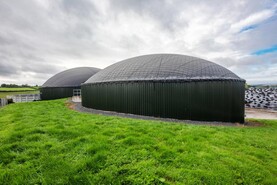Teagasc is currently developing a feasibility study on the availability of sustainable feedstocks in Ireland which are essential for a viable anaerobic digestion (AD) industry, Minister for Agriculture Michael Creed has revealed.
“This report will help to inform the types of support necessary for the future development of the anaerobic digestion industry in Ireland,” Minister Creed said this week.
He was asked by Fianna Fáil agriculture spokesperson Charlie McConalogue if his Department had a consultation with the Department of Communications, Climate Action and Environment on the introduction of grant support for anaerobic digestors.
No grants
Minister Creed said there are currently no grants available for the building of anaerobic digestors, but said that his Department recognises the potential environmental and economic benefits of using anaerobic digestion. This, he said, includes climate mitigation, and renewable energy generation as well as supporting a diversification of income for farmers.
“Research suggests that the biogas produced from AD could potentially play a significant role in the heat and transport sectors.
“The role indigenous sources of renewable energy will play in future will become more important as we seek to reduce our reliance on imported fuels and in meeting our challenging renewable energy targets into the future and decarbonising our energy systems by 2050.
Research suggests that the biogas produced from AD could potentially play a significant role in the heat and transport sectors
“The anaerobic digestion industry in Ireland is still at an early stage of development when compared to the more established industry in mainland Europe. Models for AD plants in Ireland are varied and are typically standalone on-farm plants which rely on own-sourced manure from farming activity in addition to other feedstocks such as food waste to supply a continued raw material for power generation,” he said.
Challenges
He added that there are many challenges, both economic and operational, to the establishment of a viable AD industry in Ireland.
“The cost efficiency of this technology remains challenging due to the low energy content of farm manure and the seasonality of grass/slurry supply under Irish farming conditions.”
He said his Department is committed to working with the Department for Communications, Climate Action and Environment, to ensure that the supply of domestic fuels available in the forest and agriculture sectors are mobilised to support energy generation from a range of bioenergy technologies.
Read more
Nitrogen-rich feedstocks – feed heaven or feed hell?
The challenge with grass-based anaerobic digesters
Teagasc is currently developing a feasibility study on the availability of sustainable feedstocks in Ireland which are essential for a viable anaerobic digestion (AD) industry, Minister for Agriculture Michael Creed has revealed.
“This report will help to inform the types of support necessary for the future development of the anaerobic digestion industry in Ireland,” Minister Creed said this week.
He was asked by Fianna Fáil agriculture spokesperson Charlie McConalogue if his Department had a consultation with the Department of Communications, Climate Action and Environment on the introduction of grant support for anaerobic digestors.
No grants
Minister Creed said there are currently no grants available for the building of anaerobic digestors, but said that his Department recognises the potential environmental and economic benefits of using anaerobic digestion. This, he said, includes climate mitigation, and renewable energy generation as well as supporting a diversification of income for farmers.
“Research suggests that the biogas produced from AD could potentially play a significant role in the heat and transport sectors.
“The role indigenous sources of renewable energy will play in future will become more important as we seek to reduce our reliance on imported fuels and in meeting our challenging renewable energy targets into the future and decarbonising our energy systems by 2050.
Research suggests that the biogas produced from AD could potentially play a significant role in the heat and transport sectors
“The anaerobic digestion industry in Ireland is still at an early stage of development when compared to the more established industry in mainland Europe. Models for AD plants in Ireland are varied and are typically standalone on-farm plants which rely on own-sourced manure from farming activity in addition to other feedstocks such as food waste to supply a continued raw material for power generation,” he said.
Challenges
He added that there are many challenges, both economic and operational, to the establishment of a viable AD industry in Ireland.
“The cost efficiency of this technology remains challenging due to the low energy content of farm manure and the seasonality of grass/slurry supply under Irish farming conditions.”
He said his Department is committed to working with the Department for Communications, Climate Action and Environment, to ensure that the supply of domestic fuels available in the forest and agriculture sectors are mobilised to support energy generation from a range of bioenergy technologies.
Read more
Nitrogen-rich feedstocks – feed heaven or feed hell?
The challenge with grass-based anaerobic digesters






 This is a subscriber-only article
This is a subscriber-only article










SHARING OPTIONS: